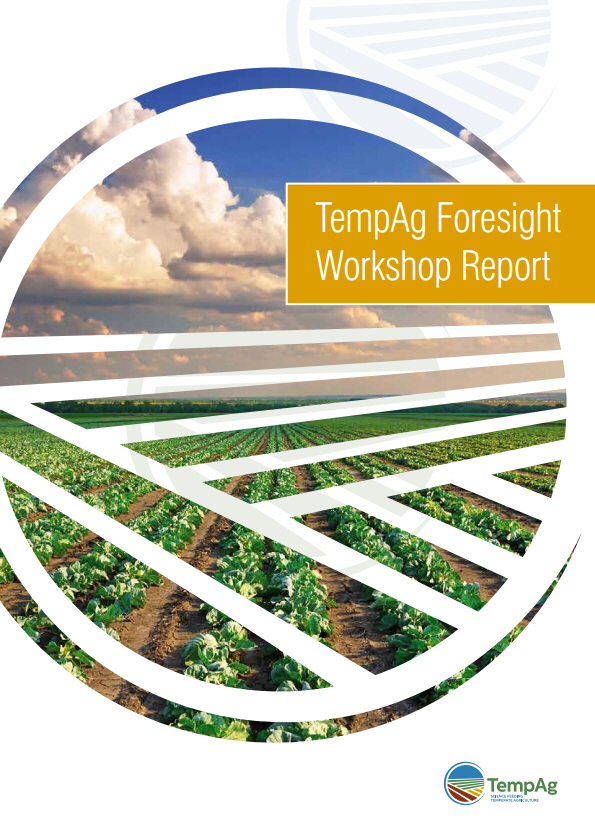The TempAg Governing Board met in Paris to discuss outcomes and recommendations from the Foresight workshop report, and how these recommendations could develop into future activity. Professor Peter Gregory, who has chaired TempAg since its inception, announced that he will be stepping down as TempAg Chair and will be replaced by Professor Tim Benton (University of Leeds).
International Sustainable Temperate Agriculture Network (TempAg)
TempAg is a global research collaboration network established to increase the impact of agricultural research and inform policy making in the world’s temperate regions. Through its activities, TempAg enables policy makers, funding bodies, scientists, and other decision makers, to align national and transnational research agendas to allow innovations and policy interventions for sustainable agriculture in temperate zones.
Timeline of activities
TempAg Foresight workshop report published

TempAg Foresight Workshop Report
TempAg held a Foresight workshop in October 2016. 40 delegates from academia, policy, industry and professionals in the science-policy interface across 14 temperate countries participated.
(You can view PDF documents by downloading a PDF reader. We recommend using Google Chrome or Mozilla Firefox web browsers.)
TempAg Foresight workshop, London
TempAg held a workshop in London to review key issues for sustainable agriculture in temperate countries and identify areas for cross-country collaboration. Delegates from 14 temperate countries participated, with expertise across academia, policy, industry and the science-policy interface.
de Olde et al. publish outputs from TempAg’s work on sustainability frameworks, metrics and tools
This paper (When experts disagree: the need to rethink indicator selection for assessing sustainability of agriculture (PDF)) identifies the most important criteria for experts when selecting indicators for sustainability in temperate agriculture.
Survey of Sustainability Assessment Methods report published
This work compiled and assessed existing sustainability frameworks in agriculture, highlighting the complexity of Integrated Sustainability Assessment methods (PDF) and the variability in their characteristics.
TempAg’s formal inauguration at OECD, Paris
The network initiates under the auspices of the OECD Global Science Forum with eight signatory countries as full members.
Scientific rationale
Agriculture in temperate areas is highly productive, a significant proportion of global agricultural output originating from temperate (i.e. non tropical) countries (ref 1, ref 2, ref 3) with this proportion very likely to increase in light of climate change (ref 4, ref 5, ref 6, ref 7). Given the intense agricultural production and advanced agricultural practices performed in temperate areas, there is a growing need for more sustainable and resilient approaches as well as greater connectivity of national research and policy agendas in temperate countries.
TempAg as a global collaborative research network aspires to play an important role (in collaboration with other key international stakeholders) in identifying the type of scientific evidence needed by policy makers to achieve targets relevant to agriculture, and help deliver these agendas in a consistent manner across the temperate region.
TempAg activity is focused around three main scientific themes:
- Resilient agricultural production systems at multiple spatial and temporal levels
Enhancing sustainability metrics, frameworks and tools for future-proofing agricultural decision making at multiple levels and scales – led by New Zealand, this activity aims to deliver clarity on the compatibility of sustainability indicators across multiple levels (for farm, industry, policy, and other stakeholders) and is expected to result in a 10% increase in the state of agreed indicators of sustainability across scales for member countries by 2025. - Optimal land management for food production and other ecosystem services
Optimising synergies between agricultural production and ecosystem services via an overview of the research landscape – led by Sweden and France, this activity aims to identify the research gaps concerning agricultural ecosystem services – including production – by listing and recording ongoing national and international activities on agricultural ecosystem services. - Sustainable improvement of food productivity in the farm and enterprise level
Addressing yield gaps, resource use efficiencies and environmental impact – led by the Netherlands, this activity is looking to examine how to sustainably improve food productivity at a farm/enterprise level, through addressing yield gaps, resource use efficiencies and environmental impact.
References
- Food for thought (PNAS, Volume 108, No. 50, p19845–19846, 2011).
- Solutions for a cultivated planet (Nature, Volume 478, p337-342, 2011).
- Trading carbon for food: Global comparison of carbon stocks vs. crop yields on agricultural land (PNAS, Volume 107, No. 46, p19645–19648, 2010).
- Food and Agriculture Organization of the United Nations: Climate change, global agriculture and regional vulnerability.
- Implications of climate change for agricultural productivity in the early 21st century (Phil. Trans. R. Soc. B, Volume 365, p2973–2989, 2010).
- Impacts of Present and Future Climate Variability on Agriculture and Forestry in the Temperate Regions: Europe (Climatic Change, Volume 70, No. 1, p 117–135, 2005).
- Effects of climate change on global food production under SRES emissions and socio-economic scenarios (Global Environmental Change, Volume 14, p53–67, 2004).





